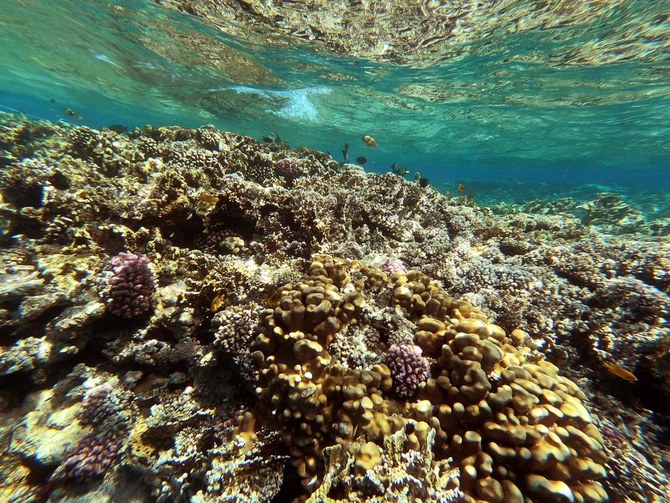SHARM EL SHEIKH, Egypt: Standing on a boat bobbing gently in the Red Sea, Egyptian diving instructor Mohamed Abdelaziz looks on as tourists snorkel amid the brilliantly colored corals, a natural wonder now under threat from climate change.
“If they disappear, we’ll disappear with them,” he says of the vibrant corals on the reef, a species-rich ecosystem just below the turquoise waters that is beloved by diving enthusiasts worldwide.
Coral reefs — often dubbed the “rainforests of the oceans” for their rich biodiversity — are under threat everywhere as rising sea temperatures and acidification cause catastrophic “bleaching” events.
Along with pollution and dynamite fishing, global warming wiped out 14 percent of the world’s coral reefs between 2009 and 2018, says a new survey by the Global Coral Reef Monitoring Network, the biggest ever carried out.
Some studies have suggested that many species of coral in the Red Sea — which is also bordered by the Saudi peninsula, Sudan and Eritrea — are unusually heat-resistant, but local professionals say they have already witnessed the damage.
“We can see the effects of global warming before our eyes,” said Islam Mohsen, 37, another local diving instructor at the resort town of Sharm El-Sheikh.
“We can see the coral discoloring and turning white.”
Coral reefs cover only a tiny fraction — 0.2 percent — of the ocean floor, but they are home to at least a quarter of all marine animals and plants.
The Red Sea and Gulf of Aden boast the most biologically diverse coral reef communities outside of Southeast Asia.
The Red Sea — with just over five percent of the world’s coral reefs — is home to 209 types of coral, according to Egypt’s environment ministry.
The new global survey said that live hard coral cover in the region fluctuated over recent decades but declined overall, from 36.1 percent in 1997 to 34.3 percent in 2019.
Causes for the degraded reefs varied by location but included tourism activities, coastal development, land runoff and overfishing, the report said.
Steps have been taken in Egypt to protect reefs and marine life that are crucial to the local tourism sector.
Egypt’s Chamber of Diving and Water Sports — which oversees 269 diving centers and over 2,900 professional divers — has protected fragile areas with buoys to keep boats from mooring.
It has also suspended beginners’ diving classes in some areas to allow damaged reefs to recover.
But the largest looming threat, far harder to fix, is global warming.
Oceans absorb more than 90 percent of the excess heat from greenhouse gas emissions, shielding land surfaces but generating huge, long-lasting marine heatwaves.
These are pushing many species of corals past their limits of tolerance.
“When the temperature of the ocean goes up, it absorbs more carbon dioxide, which creates carbonic acid,” said Cairo-based climate change consultant Katherine Jones.
“So not only will the temperature increase, but the PH level will change too,” affecting all animals with shells, she said. “We will lose a lot of wildlife, and the ecosystem will be changing in a way that affects us as humans in terms of resources.
“The coral reefs are nurseries to baby fish and a feeding ground to bigger fish ... it’s an essential part of the ecosystem.”
Sharm El-Sheikh hosted a United Nations agencies conference in 2018 that called for the protection of coral reefs “before it’s too late.”
Egypt also plans to host the Climate Conference of the Parties (COP27) in November next year.
A report by the Intergovernmental Panel on Climate Change has warned that up to 90 percent of coral reefs “may be gone by mid-century” even if the rise in temperatures stabilizes below 1.5 degrees Celsius.
Jones warned that, as things stand now, climate change and its impacts can no longer be reversed — only slowed — to prevent the worst consequences.
“Even if humans completely disappear from Earth tomorrow or we stopped producing any kind of emissions,” she said, “the temperature will continue to rise by itself.”
In Egypt’s Red Sea, corals fade as oceans warm
In Egypt’s Red Sea, corals fade as oceans warm

Israel says more troops to ‘enter Rafah’ as operations intensify

The operation in Rafah “will continue as additional forces will enter” the area, Gallant said, adding that “several tunnels in the area have been destroyed by our troops... this activity will intensify.”
“Hundreds of [terror] targets have already been struck, and our forces are manoeuvring in the area,” he said in a ministry statement.
Tunisia blasts foreign criticism of arrests as ‘interference’

- Several prominent Tunisian pundits, journalists, lawyers and civil society figures have been arrested in recent days
- Late Saturday, masked police raided the Tunisian bar association headquarters and forcibly arrested lawyer Sonia Dahmani
TUNIS: Tunisian President Kais Saied on Thursday denounced foreign “interference” following international criticism of a recent flurry of arrests of political commentators, lawyers and journalists in the North African country.
Saied, who in 2021 orchestrated a sweeping power grab, ordered the foreign ministry to summon diplomats and “inform them that Tunisia is an independent state.”
Speaking during a televised meeting, the president told Mounir Ben Rjiba, state secretary to the foreign ministry, to “summon as soon as possible the ambassadors of a number of countries,” without specifying which ones.
Ben Rjiba was asked to “strongly object to them that what they are doing is a blatant interference in our internal affairs.”
“Inform them that Tunisia is an independent state that adheres to its sovereignty,” Saied added.
“We didn’t interfere in their affairs when they arrested protesters... who denounced the war of genocide against the Palestinian people,” he added, referring to demonstrations on university campuses in the United States and elsewhere over the Israel-Hamas war.
Several prominent Tunisian pundits, journalists, lawyers and civil society figures have been arrested in recent days, many of whom over a decree that punishes “spreading false information” with up to five years in prison.
Since Decree 54 came into force with Saied’s ratification in 2022, more than 60 journalists, lawyers and opposition figures have been prosecuted under it, according to the National Union of Tunisian Journalists.
Late Saturday, masked police raided the Tunisian bar association headquarters and forcibly arrested lawyer Sonia Dahmani over critical comments she had made on television.
On Monday police entered the bar association again and arrested Mehdi Zagrouba, another lawyer, following a physical altercation with officers. Zagrouba was subsequently hospitalized.
The arrests have sparked Western condemnation.
The European Union on Tuesday expressed concern that Tunisian authorities were cracking down on dissenting voices.
France denounced “arrests, in particular of journalists and members of (non-governmental) associations,” while the United States said they were “in contradiction” with “the universal rights explicitly guaranteed by the Tunisian Constitution.”
The media union said Wednesday that Decree 54 was “a deliberate attack on the essence of press freedom and a vain attempt to intimidate journalists and media employees and sabotage public debate.”
NGOs have decried a rollback of freedoms in Tunisia since Saied — who was elected democratically in October 2019 with a five-year mandate — began ruling by decree following the July 2021 power grab.
Egypt rejects Israeli plans for Rafah crossing, sources say

- An Israeli official said a delegation traveled to Egypt amid rising tension between the two countries
CAIRO: Egypt has rejected an Israeli proposal for the two countries to coordinate to re-open the Rafah crossing between Egypt’s Sinai Peninsula and the Gaza Strip, and to manage its future operation, two Egyptian security sources said.
Officials from Israeli security service Shin Bet presented the plan on a visit to Cairo on Wednesday, amid rising tension between the two countries following Israel’s military advance last week into Rafah, where hundreds of thousands of Palestinians displaced by war have been sheltering.
The Rafah crossing has been a main conduit for humanitarian aid entering Gaza, and an exit point for medical evacuees from the territory, where a humanitarian crisis has deepened and some people are at risk of famine. Israel took operational control of the crossing and has said it will not compromise on preventing Hamas having any future role there.
The Israeli proposal included a mechanism for how to manage the crossing after an Israeli withdrawal, the security sources said. Egypt insists the crossing should be managed only by Palestinian authorities, they added.
An Israeli official who requested anonymity said the delegation traveled to Egypt “mainly to discuss matters around Rafah, given recent developments,” but declined to elaborate.
Egypt’s foreign press office did not immediately respond to a request for comment.
Egypt and Israel have a long-standing peace treaty and security cooperation, but the relationship has come under strain during the Gaza war, especially since the Israeli advance around Rafah.
The two countries traded blame this week for the border crossing closure and resulting blockage of humanitarian relief.
Egypt says Rafah’s closure is due solely to the Israeli military operation. It has warned repeatedly that Israel’s offensive aims to empty out Gaza by pushing Palestinians into Egypt.
Israeli government spokesperson David Mencer said on Wednesday that Egypt had rejected an Israeli request to open Rafah to Gazan civilians who wish to flee.
The Israeli delegation also discussed stalled negotiations for a ceasefire and hostage release in Gaza during their Cairo visit, but did not convey any new messages, the Egyptian sources said. Egypt has been a mediator in the talks, along with Qatar and the United States.
Israel’s Gaza offensive has killed more than 35,000 Palestinians, according to Gaza health officials, with at least 82 killed on Tuesday in the highest single-day toll for weeks.
Hamas-led gunmen killed some 1,200 people and abducted 253 in their Oct. 7 raid into Israel, according to Israeli tallies.
Bahrain king calls for international Mideast peace conference

- Saudi Arabia’s Crown Prince Mohammed bin Salman called for the establishment of an internationally recognized Palestinian state
- It is the first time the Arab leaders have come together after Riyadh hosted an extraordinary summit in November where the bloc condemned Israel’s “barbaric” actions in Gaza
- Palestinian leader Mahmoud Abbas says Hamas gave Israel ‘pretexts’ to attack Gaza
MANAMA: The King of Bahrain, Hamad bin Isa Al Khalifa, called for an international conference for peace in the Middle East at the opening of the Arab League Summit in Manama.
The king, and the summit’s host, reaffirmed his country’s support for the full recognition of a Palestinian state and the acceptance of its membership in the United Nations.
He stressed that the establishment of a Palestinian state will reflect positively on the region.
Last week, the UN General Assembly overwhelmingly backed a Palestinian bid to become a full UN member and called on the UN Security Council to reconsider the request.
The vote by the 193-member General Assembly was a global survey of support for the Palestinian bid to become a full UN member - a move that would effectively recognize a Palestinian state - after the US vetoed it in the UN Security Council last month.
“What the Palestinians are facing requires a unified international stance,” the King of Bahrain said.
During his opening remarks at the summit, Saudi Arabia’s Crown Prince Mohammed bin Salman called for the establishment of an internationally recognized Palestinian state.
The prince was among the Arab delegates who arrived in Manama on Thursday for the Arab League Summit.
#PHOTOS: #SaudiArabia's Crown Prince Mohammed bin Salman arrives in #Manama for 2024 #Arab League summit https://t.co/zq5WR48Ig9 pic.twitter.com/IrbZKdQ5rS
— Arab News (@arabnews) May 16, 2024
During his speech, the prince highlighted the Kingdom’s efforts in alleviating the humanitarian crisis in Gaza, reiterating Saudi Arabia’s support for issues of the Arab world.
He urged the international community to back ceasefire efforts and halt the aggression on Palestinian civilians.
It is the first time the Arab leaders come together after Riyadh hosted an extraordinary summit in November where the bloc condemned Israel’s “barbaric” actions in Gaza.
The one-day summit was set to discuss events in Gaza, propose a ceasefire and push for a Palestinian state.
“The Kingdom calls for conflict resolution through peaceful means,” the prince said.
Palestinian leader slams Hamas
The Palestinian president Mahmoud Abbas criticized Hamas for giving Israel the ‘pretext to attack’ Gaza with the Oct. 7 attack.
“Hamas’ rejection of ending the division serves Israel’s interest in ending the two-state solution,” he noted, pointing to the long-standing tensions between the Palestinian Authority and the militant group governing Gaza.
He said the Palestinian government has not received the financial support it had expected from international and regional partners, noting that Israel is still withholding the funds and creating a dire situation.
the Palestinian leader called on Arab countries for financial support and the US to pressure Israel into releasing the funds.
“It has now become critical to activate the Arab safety net, to boost the resilience of our people and to enable the government to carry out its duties,” Abbas added.
He also urged the international community to start immediately with the implementation of the two-state solution and reiterated ‘full rejection’ of the displacement of Palestinians, who just marked the 76th anniversary of the 1948 Nakba.
Qatar’s Emir Tamim bin Hamad Al Thani, UAE’s Vice President and Prime Minister Mohammed bin Rashid, Kuwait’s Prime Minister Sheikh Ahmad Abdullah Al-Ahmad Al-Sabah, and Syria’s President Bashar Al Assad were among the attendees on Thursday.
Lebanon media says Israel struck Hezbollah eastern stronghold overnight

- Israel and Hamas ally Hezbollah have exchanged near-daily fire following the Palestinian group’s October 7 attack on southern Israel that sparked the war in Gaza
Beirut: Lebanese state-run media reported Thursday an overnight Israeli air raid on eastern Lebanon, where Hezbollah holds sway, hours after the Iran-backed armed group launched an attack deep into Israeli territory.
Israel and Hamas ally Hezbollah have exchanged near-daily fire following the Palestinian group’s October 7 attack on southern Israel that sparked the war in Gaza, now in its eighth month.
Lebanon’s official National News Agency said that “the outskirts of the eastern Lebanon mountain range, at midnight (2100 GMT Wednesday), was subjected to five enemy raids.”
The strikes in the Baalbek area “slightly injured a citizen” and caused fires, the report added.
A source close to Hezbollah told AFP that one of the strikes “hit a Hezbollah military camp.”
An Israeli army spokesman told AFP: “I can confirm that an airstrike was indeed conducted deep in Lebanon against a terror target related to Hezbollah’s precision missile project.”
The area of Baalbek in the Bekaa valley is a Hezbollah bastion, bordering Syria.
Hezbollah launchrocket barrage at Israeli positions
Lebanon’s Iran-backed Hezbollah group said it launched on Thursday “more than 60” rockets at Israeli military positions in retaliation for overnight air strikes.
Hezbollah fighters “launched a missile attack with more than 60 Katyusha rockets” on several Israeli military positions including in the Israeli-annexed Golan Heights, the group said in a statement, adding it was “in response to the Israeli enemy’s attacks last night on the Bekaa region” in Lebanon’s east.
The cross-border fighting has killed at least 413 people in Lebanon, mostly militants but also including dozens of civilians, according to an AFP tally.
Israel says 14 soldiers and 10 civilians have been killed on its side of the border.
Tens of thousands of people have been displaced in areas on both sides of the border.

















